Tag Archives: Antiquities Act
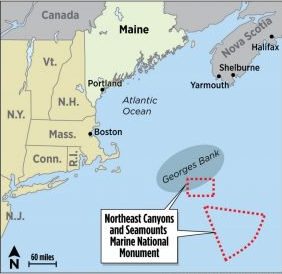
Lawmakers to Trump: Keep Marine Monument protections
More than a quarter of state lawmakers wrote to President Donald Trump on Wednesday, urging him not to roll back protections for the Northeast Canyons and Seamounts Marine National Monument. None of Cape Ann’s representatives — Senate Minority Leader Bruce Tarr, and Reps. Ann-Margaret Ferrante and Brad Hill — were among the signers. Nine of the 38 current state senators and 46 of the 153 representatives signed the letter, which said the monument “does not occur in a major fishing ground” and opening it to commercial fishing would “not help remedy the nation’s seafood deficit.” >click to read<09:23

Land ahoy! Fishermen challenge presidential designations of ocean monuments
This month, the Antiquities Act turned 112 years old. Originally conceived to protect Native American artifacts in the Southwest, the law has, like so many federal laws, been twisted over time by power-hungry government officials. Controversy over the law’s abuse is coming to a head in New England, where fishermen are locked out of a large section of their fishery by the creation of the Northeast Canyons and Seamounts Marine National Monument. After spending years working to recover fish stocks and promote more sustainable fishing methods, they rightly see this move as a betrayal that threatens their livelihoods. Why is a 112-year-old law so controversial today? The answer lies in the aggressive reinterpretation of the law by presidents seeking to expand their power. >click to read<14:00
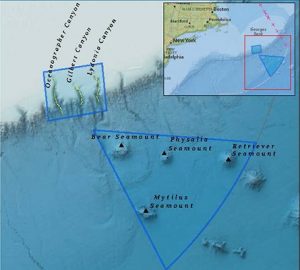
If courts are ever going to strike down an illegal national monument, this’ll be it
Often, it seems the federal government has it out for the English language. The President and federal agencies routinely twist the words in statutes beyond recognition. For instance, PLF has long challenged EPA’s bizarre claim that dry land is “water” under the Clean Water Act. The government’s no fan of consistency, so it should come as little surprise that the President also claims the ocean is “land” when that suits his purposes. In Massachusetts Lobstermen’s Association, et al. v. Ross, PLF is challenging the designation of 5,000 square miles of ocean as the Northeast Canyons and Seamounts Marine National Monument, under a statute that expressly limits designations to “land owned or controlled by the Federal Government.” The government has moved to dismiss that case arguing that the President can essentially do whatever he wants, the language of the statute be damned. Today, we filed our response to that motion. In our brief we explain that: Pacific Legal Foundation >click to read<21:52
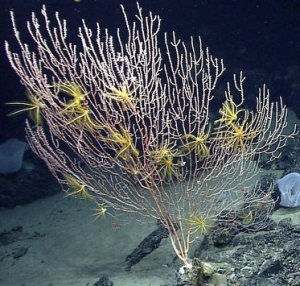
Trump Administration Facing Battle Over New England Marine Monument
“We will challenge in court any action to roll back the Coral Canyons and Seamounts monument and we expect to win,” said Priscilla Brooks, director of ocean conservation for the Boston-based Conservation Law Foundation. But Jon Williams, owner of the Atlantic Red Crab Company in New Bedford, Mass., said he and other commercial fishermen who have harvested crabs and deep sea lobsters from the Coral Canyons region for decades are delighted with the Trump administration’s proposal. click here to read the story 08:22
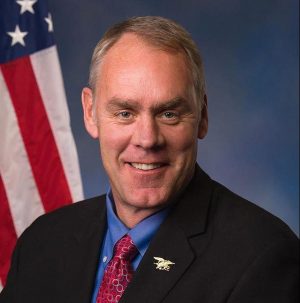
Zinke backs shrinking more national monuments and shifting management of 10
Interior Secretary Ryan Zinke on Tuesday called on President Trump to shrink a total of four national monuments and change the way six other land and marine sites are managed, a sweeping overhaul of how protected areas are maintained in the United States.,,, He also would revise the proclamations for those and the others to clarify that activities such as grazing, motorized vehicle use and commercial fishing should be allowed. The additional monuments affected include Northeast Canyons and Seamounts in the Atlantic Ocean; both Rose Atoll and the Pacific Remote Islands in the Pacific Ocean; New Mexico’s Organ Mountain-Desert Peaks and Rio Grande Del Norte; and Maine’s Katahdin Woods and Waters. click here to read the story 16:50
Lawmaker Wants Checks on Presidential Power to Set Aside Public Land
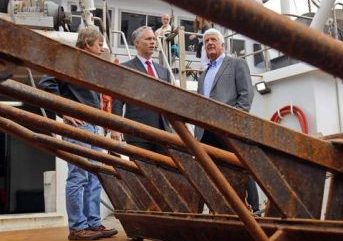 A congressional committee will consider a bid to restrict the president’s ability to use the Antiquities Act to set aside vast swaths of public land for conservation purposes. U.S. Rep. Rob Bishop, Utah Republican and vocal opponent of federal control of public lands, introduced House Resolution 3990 on Friday, which would trigger environmental reviews and congressional approvals if a U.S. president uses the Antiquities Act to set aside more than 640 acres less than 50 miles away from another national monument. click here to read the story 12:30
A congressional committee will consider a bid to restrict the president’s ability to use the Antiquities Act to set aside vast swaths of public land for conservation purposes. U.S. Rep. Rob Bishop, Utah Republican and vocal opponent of federal control of public lands, introduced House Resolution 3990 on Friday, which would trigger environmental reviews and congressional approvals if a U.S. president uses the Antiquities Act to set aside more than 640 acres less than 50 miles away from another national monument. click here to read the story 12:30
Yes, Trump can revoke national monuments
 Interior Secretary Ryan Zinke has finally completed a months-long review of dozens of controversial national monuments, recommending major changes to 10 monuments, including shrinking six and relaxing regulation of the other four. Before the specific recommendations became public, the president’s opponents were already threatening lawsuits, claiming the president has no authority to change existing monuments. With the recommendations now public, it is only a matter of time before the litigation floodgates open. Everyone should take a deep breath.,,, Nothing in the Antiquities Act forbids the president from revoking or shrinking a national monument. And the theory is belied by history: Seven presidents have shrunk national monuments, including President William Howard Taft, who reduced the Navajo National Monument by nearly 90 percent. click here to read the op-ed 12:10
Interior Secretary Ryan Zinke has finally completed a months-long review of dozens of controversial national monuments, recommending major changes to 10 monuments, including shrinking six and relaxing regulation of the other four. Before the specific recommendations became public, the president’s opponents were already threatening lawsuits, claiming the president has no authority to change existing monuments. With the recommendations now public, it is only a matter of time before the litigation floodgates open. Everyone should take a deep breath.,,, Nothing in the Antiquities Act forbids the president from revoking or shrinking a national monument. And the theory is belied by history: Seven presidents have shrunk national monuments, including President William Howard Taft, who reduced the Navajo National Monument by nearly 90 percent. click here to read the op-ed 12:10
NOAA seeks jurisdiction of Lake Michigan waters next to Wisconsin – Protecting shipwrecks or shipwrecking the economy?
 The National Oceanic and Atmospheric Administration (NOAA) is preparing to designate the waters of Lake Michigan next to Manitowoc, Sheboygan, and Ozaukee counties as a national marine sanctuary, and that has set off a howl of protest that the state is surrendering its jurisdictional authority to the federal government, which critics say could threaten commercial fishing and coastal recreational activities, among other things. Meanwhile, both the Trump administration and Congress are looking into the national marine sanctuary program and into what some say are its overreaching and unilateral power to impose restrictions in the sanctuary areas. click here to read the story 09:41
The National Oceanic and Atmospheric Administration (NOAA) is preparing to designate the waters of Lake Michigan next to Manitowoc, Sheboygan, and Ozaukee counties as a national marine sanctuary, and that has set off a howl of protest that the state is surrendering its jurisdictional authority to the federal government, which critics say could threaten commercial fishing and coastal recreational activities, among other things. Meanwhile, both the Trump administration and Congress are looking into the national marine sanctuary program and into what some say are its overreaching and unilateral power to impose restrictions in the sanctuary areas. click here to read the story 09:41
Northeast Canyons and Seamounts Marine National Monument under review, Beaton hoping for modifications
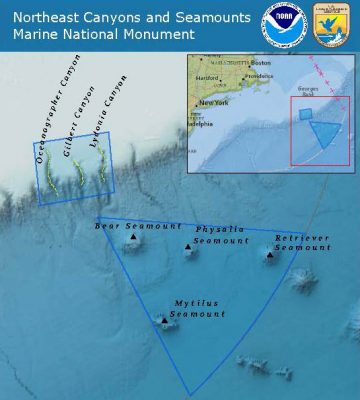 The state’s top environmental official hopes the Trump administration modifies President Barack Obama’s 2016 designation of a marine monument area off the Massachusetts coast, which is on the Trump administration’s list of areas under review. Environmental protection activists last year applauded Obama’s decision, made under powers granted through the Antiquities Act, to create the Northeast Canyons and Seamounts Marine National Monument covering a more than 4,900 square mile area southeast of Cape Cod. The designation came with strict limits on fishing that were greeted with pushback from port communities and some elected officials, including Gov. Charlie Baker, whose administration knocked an alleged lack of public process, potential negative impacts on commercial fishing, and conflicts with existing marine fisheries planning processes. click here to read the story 12:11
The state’s top environmental official hopes the Trump administration modifies President Barack Obama’s 2016 designation of a marine monument area off the Massachusetts coast, which is on the Trump administration’s list of areas under review. Environmental protection activists last year applauded Obama’s decision, made under powers granted through the Antiquities Act, to create the Northeast Canyons and Seamounts Marine National Monument covering a more than 4,900 square mile area southeast of Cape Cod. The designation came with strict limits on fishing that were greeted with pushback from port communities and some elected officials, including Gov. Charlie Baker, whose administration knocked an alleged lack of public process, potential negative impacts on commercial fishing, and conflicts with existing marine fisheries planning processes. click here to read the story 12:11
Western Pacific Regional Fishery Management Council seeks to Reopen Papahanaumokuakea to Fishing
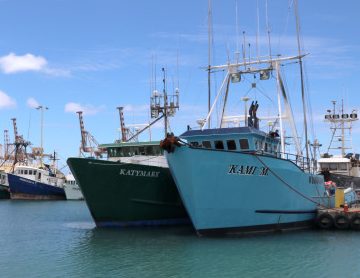 The Western Pacific Regional Fishery Management Council concluded its three-day meeting in Honolulu with a suite of recommendations, many of which are focused on keeping U.S. fishing grounds open to sustainably managed U.S. fisheries. The council includes the local fishery department directors from Hawaii, American Samoa, Guam and the CNMI, fishing experts appointed by the Governors and federal agencies involved in fishing-related activities. Marine national monuments, national marine sanctuaries, other marine protected area designations and Department of Defense training are among the uses that are increasingly closing off fishing grounds in U.S. waters. Council Chair Edwin A. Ebisui Jr. clarified that council communications to the administration about impacts of marine national monuments on fisheries are not lobbying. Some environmental activists recently made misleading statements about this in regards to a letter to President Trump prepared on March 1, 2017, by the Council Coordination Committee or CCC. The CCC includes the chairs of the nation’s eight regional fishery management councils. The letter details the impact of designations of Marine National Monuments under the Antiquities Act in the Atlantic and Pacific Oceans and was submitted to the president after conferring with the NOAA Office of General Counsel. To address the impacts of ever increasing fishing grounds being closed, the council agreed to the following: continue reading the story here 06:09
The Western Pacific Regional Fishery Management Council concluded its three-day meeting in Honolulu with a suite of recommendations, many of which are focused on keeping U.S. fishing grounds open to sustainably managed U.S. fisheries. The council includes the local fishery department directors from Hawaii, American Samoa, Guam and the CNMI, fishing experts appointed by the Governors and federal agencies involved in fishing-related activities. Marine national monuments, national marine sanctuaries, other marine protected area designations and Department of Defense training are among the uses that are increasingly closing off fishing grounds in U.S. waters. Council Chair Edwin A. Ebisui Jr. clarified that council communications to the administration about impacts of marine national monuments on fisheries are not lobbying. Some environmental activists recently made misleading statements about this in regards to a letter to President Trump prepared on March 1, 2017, by the Council Coordination Committee or CCC. The CCC includes the chairs of the nation’s eight regional fishery management councils. The letter details the impact of designations of Marine National Monuments under the Antiquities Act in the Atlantic and Pacific Oceans and was submitted to the president after conferring with the NOAA Office of General Counsel. To address the impacts of ever increasing fishing grounds being closed, the council agreed to the following: continue reading the story here 06:09
UPDATED: GOP Kicks Off Effort To Roll Back Obama’s Monument Designations
 House lawmakers kicked off their effort to push back against national monuments designations, targeting the large swaths of ocean the Obama administration made off limits to fishing. “I don’t believe the Antiquities Act should have ever been applied to oceans,” Alaska Republican Rep. Don Young said during a Wednesday hearing on marine monument designations. “There was never intent of that.” Republicans on the House Committee on Natural Resources have long criticized former President Barack Obama’s use of the Antiquities Act to put millions of square miles off limits to commercial fishing with little to no input from locals. New Bedford Mayor Jon Mitchell, who couldn’t attend the hearing due to a snow storm, is a Democrat who represents a Massachusetts community dependent on fishing. Mitchell wants to change how national monuments are designated to include more local input. Mitchell was not a fan of Obama unilaterally designating the Northeast Canyons and Seamounts Marine National Monument in September. continue reading the story here 16:02
House lawmakers kicked off their effort to push back against national monuments designations, targeting the large swaths of ocean the Obama administration made off limits to fishing. “I don’t believe the Antiquities Act should have ever been applied to oceans,” Alaska Republican Rep. Don Young said during a Wednesday hearing on marine monument designations. “There was never intent of that.” Republicans on the House Committee on Natural Resources have long criticized former President Barack Obama’s use of the Antiquities Act to put millions of square miles off limits to commercial fishing with little to no input from locals. New Bedford Mayor Jon Mitchell, who couldn’t attend the hearing due to a snow storm, is a Democrat who represents a Massachusetts community dependent on fishing. Mitchell wants to change how national monuments are designated to include more local input. Mitchell was not a fan of Obama unilaterally designating the Northeast Canyons and Seamounts Marine National Monument in September. continue reading the story here 16:02
Fishing Industry Tells Committee Regulations Go Too Far – Allegations of bad science and lobbying by overzealous environmentalists dominated talks on marine sanctuary and monument designations during a Congressional hearing Wednesday. Read the story here 18:02
Will Trump Be Able To Undo Papahanaumokuakea, Northeast Canyons and Seamounts Marine National Monuments?
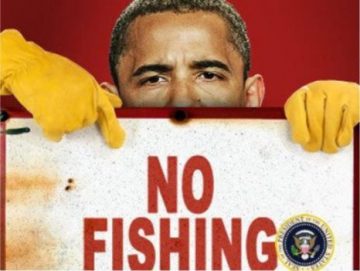 In the months leading up to the Nov. 8 election, President Barack Obama signed a series of proclamations to dramatically increase the amount of land and water that is federally protected from commercial fishing, mining, drilling and development. On Aug. 24, he established a nearly 90,000-acre national monument in the Katahdin Woods of Maine. Two days later, Obama expanded Papahanaumokuakea Marine National Monument around the Northwestern Hawaiian Islands by 283 million acres, making it the world’s largest protected area at the time. And on Sept. 15, he created the first national monument in the Atlantic Ocean, protecting more than 3 million acres of marine ecosystems, seamounts and underwater canyons southeast of Cape Cod, Massachusetts. It’s mostly speculation at this point as to what Trump will do but groups on both sides of the issue are keeping a watchful eye on things. Advocates for commercial fishing interests on the East Coast have started nudging policymakers to consider what changes the next administration could make. But West Coast and Hawaii industry groups are still gathering information and developing plans. Read the rest here 08:47
In the months leading up to the Nov. 8 election, President Barack Obama signed a series of proclamations to dramatically increase the amount of land and water that is federally protected from commercial fishing, mining, drilling and development. On Aug. 24, he established a nearly 90,000-acre national monument in the Katahdin Woods of Maine. Two days later, Obama expanded Papahanaumokuakea Marine National Monument around the Northwestern Hawaiian Islands by 283 million acres, making it the world’s largest protected area at the time. And on Sept. 15, he created the first national monument in the Atlantic Ocean, protecting more than 3 million acres of marine ecosystems, seamounts and underwater canyons southeast of Cape Cod, Massachusetts. It’s mostly speculation at this point as to what Trump will do but groups on both sides of the issue are keeping a watchful eye on things. Advocates for commercial fishing interests on the East Coast have started nudging policymakers to consider what changes the next administration could make. But West Coast and Hawaii industry groups are still gathering information and developing plans. Read the rest here 08:47
Lawmaker: Trump Can Undo Obama’s National Monument Decrees
 A top House Republican urged President-elect Donald Trump to rescind the Obama administration’s decisions to put millions of acres of land and ocean under stricter federal control by turning them into National Monuments. Utah Republican Rep. Rob Bishop wants Trump to cut back on the amount of land locked up through national monument designations. President Barack Obama has used the Antiquities Act to designate 265 million acres of public land as monuments while in office. “It’s never been done before and that’s why people are saying, ‘you can’t do it.’ Of course you can do it. It’s always been implied,” Bishop said. Read the rest here 13:58
A top House Republican urged President-elect Donald Trump to rescind the Obama administration’s decisions to put millions of acres of land and ocean under stricter federal control by turning them into National Monuments. Utah Republican Rep. Rob Bishop wants Trump to cut back on the amount of land locked up through national monument designations. President Barack Obama has used the Antiquities Act to designate 265 million acres of public land as monuments while in office. “It’s never been done before and that’s why people are saying, ‘you can’t do it.’ Of course you can do it. It’s always been implied,” Bishop said. Read the rest here 13:58
U.S. Seafood Producers to White House: Don’t Harm Fisheries for Ocean Monuments
 Today, in advance of the “Our Oceans” conference being held later this week at the State Department, the National Coalition for Fishing Communities (NCFC) delivered a letter to the White House calling on the President to refrain from designating new marine monuments under the Antiquities Act. Copies of the letter were also delivered to the offices of Senators representing the states of the signers. The letter, with over 900 fishing industry signers and supported by 35 fishing organizations that represent the majority of domestic seafood harvesters, instead urges the President to conserve marine resources through the federal fisheries management process established by the bipartisan Magnuson-Stevens Fisheries Management Act (MSA). Read the story here 11:06
Today, in advance of the “Our Oceans” conference being held later this week at the State Department, the National Coalition for Fishing Communities (NCFC) delivered a letter to the White House calling on the President to refrain from designating new marine monuments under the Antiquities Act. Copies of the letter were also delivered to the offices of Senators representing the states of the signers. The letter, with over 900 fishing industry signers and supported by 35 fishing organizations that represent the majority of domestic seafood harvesters, instead urges the President to conserve marine resources through the federal fisheries management process established by the bipartisan Magnuson-Stevens Fisheries Management Act (MSA). Read the story here 11:06
Will Obama use the State Departments “Our Oceans” Conference to designate canyons and seamounts National Marine Monument?
 The third installment of the Our Ocean forum will convene in Washington, D.C., this week and the betting window is open on whether the Obama administration will use the event to announce the designation of new National Marine Monuments. No one — neither conservationists nor fishing stakeholders — claims to know exactly what will happen when the two-day, international event opens Thursday. But it has not escaped anyone’s attention that the Obama administration has used the same forum in the past to make similar announcements. The Obama administration’s decision not to use the Antiquities Act to designate any portion of Cashes Ledge as a monument validated fishing stakeholders and others who characterized the proposal — which originated with the Conservation Law Foundation, the Natural Resources Defense Council and Pew Charitable Trusts — as an end-run around the existing fisheries management system and wholly unnecessary given the existing protections already afforded the area. Read the story here 07:55
The third installment of the Our Ocean forum will convene in Washington, D.C., this week and the betting window is open on whether the Obama administration will use the event to announce the designation of new National Marine Monuments. No one — neither conservationists nor fishing stakeholders — claims to know exactly what will happen when the two-day, international event opens Thursday. But it has not escaped anyone’s attention that the Obama administration has used the same forum in the past to make similar announcements. The Obama administration’s decision not to use the Antiquities Act to designate any portion of Cashes Ledge as a monument validated fishing stakeholders and others who characterized the proposal — which originated with the Conservation Law Foundation, the Natural Resources Defense Council and Pew Charitable Trusts — as an end-run around the existing fisheries management system and wholly unnecessary given the existing protections already afforded the area. Read the story here 07:55
All For Sustainability, But Not Monument Expansion
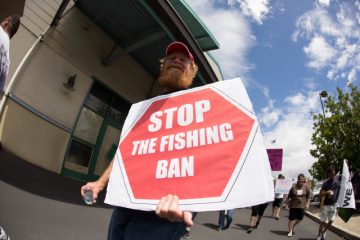 Fish and the ocean are significant to Hawaii’s history and culture. Whether it was fishing from shore or getting a half pound of poke, fish was always apart of my life and now it’s my livelihood. When I first heard of the Papahanaumokuakea National Marine Monument Sanctuary I thought it was a great idea. Protecting the fish, habitats and other marine life is something I stand for. But as I found out more about it, I completely changed my mind. The trend now is to be sustainable — eat sustainable foods and drive cars with sustainable energies. Our Hawaii fishing fleet is an example of fishing sustainably with federal observers onboard, uniquely developed fishing gear and world-renowned handling practices. Strict quotas and GPS tracking on every boat make it nearly impossible to hide anything. Read the rest here 17:26
Fish and the ocean are significant to Hawaii’s history and culture. Whether it was fishing from shore or getting a half pound of poke, fish was always apart of my life and now it’s my livelihood. When I first heard of the Papahanaumokuakea National Marine Monument Sanctuary I thought it was a great idea. Protecting the fish, habitats and other marine life is something I stand for. But as I found out more about it, I completely changed my mind. The trend now is to be sustainable — eat sustainable foods and drive cars with sustainable energies. Our Hawaii fishing fleet is an example of fishing sustainably with federal observers onboard, uniquely developed fishing gear and world-renowned handling practices. Strict quotas and GPS tracking on every boat make it nearly impossible to hide anything. Read the rest here 17:26
Antiquities Act Proposal would devastate California’s fishing industry – D.B. Pleschner
 California’s fisheries provide healthy, sustainable food, but that could change under a dangerous new proposal being circulated, until recently, behind closed doors at the Legislature. California’s fishing community – more than 40 harbors, chambers of commerce, seafood processors and recreational and commercial fishing groups – has united to oppose the proposal to declare virtually all offshore seamounts, ridges and banks off the coast as monuments under the Antiquities Act and permanently close these areas to commercial fishing. After pursuing rumors, fisheries groups discovered the proposal, along with a sign-on letter encouraging legislative support. But no one bothered to seek any input from recreational and commercial fishermen. Even worse, there has been no scientific review or economic analysis, no public participation and no transparency. Read the rest here 10:46
California’s fisheries provide healthy, sustainable food, but that could change under a dangerous new proposal being circulated, until recently, behind closed doors at the Legislature. California’s fishing community – more than 40 harbors, chambers of commerce, seafood processors and recreational and commercial fishing groups – has united to oppose the proposal to declare virtually all offshore seamounts, ridges and banks off the coast as monuments under the Antiquities Act and permanently close these areas to commercial fishing. After pursuing rumors, fisheries groups discovered the proposal, along with a sign-on letter encouraging legislative support. But no one bothered to seek any input from recreational and commercial fishermen. Even worse, there has been no scientific review or economic analysis, no public participation and no transparency. Read the rest here 10:46
Connecticut Delegation Urges Obama to Designate First Ever Atlantic Marine National Monument
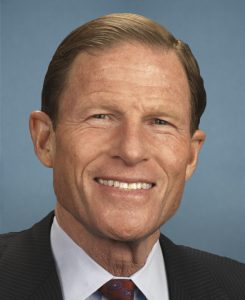 U.S. Senator Richard Blumenthal (D-Conn.) led the Connecticut Congressional Delegation today in urging President Barack Obama to designate the New England Coral Canyons and Seamounts as the nation’s first ever Atlantic marine national monument. The letter, signed by Blumenthal, U.S. Senator Chris Murphy (D-Conn.), Congressman John Larson (CT-1), Congressman Joe Courtney (CT-2), Congresswoman Rosa DeLauro (CT-3), Congressman Jim Himes (CT-4) and Congresswoman Elizabeth Esty (CT-5), urges the President to use his authority under the Antiquities Act of 1906 to preserve and protect the unique environmental treasure. Designation as a national monument would protect the area from damaging commercial activity and ensure proper care and management. The measure would protect countless species from irreversible damage, help make the ocean more resilient to climate change, support economic activity reliant on the health of the ocean, advance research, and preserve natural history. Read the rest here 15:11
U.S. Senator Richard Blumenthal (D-Conn.) led the Connecticut Congressional Delegation today in urging President Barack Obama to designate the New England Coral Canyons and Seamounts as the nation’s first ever Atlantic marine national monument. The letter, signed by Blumenthal, U.S. Senator Chris Murphy (D-Conn.), Congressman John Larson (CT-1), Congressman Joe Courtney (CT-2), Congresswoman Rosa DeLauro (CT-3), Congressman Jim Himes (CT-4) and Congresswoman Elizabeth Esty (CT-5), urges the President to use his authority under the Antiquities Act of 1906 to preserve and protect the unique environmental treasure. Designation as a national monument would protect the area from damaging commercial activity and ensure proper care and management. The measure would protect countless species from irreversible damage, help make the ocean more resilient to climate change, support economic activity reliant on the health of the ocean, advance research, and preserve natural history. Read the rest here 15:11
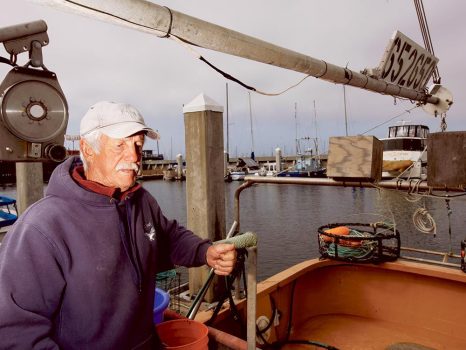
California fishermen, enviros fight over proposal to protect underwater seamounts.
California fishermen first learned of the proposal in May, out of the blue. In a six-page, unattributed document, the proposal suggested turning several of the state’s offshore seamounts, ridges and banks into national monuments, permanently closing them to fishing as well as oil and gas development. Under the federal Antiquities Act of 1906, presidents have the power to designate monuments, and implicitly, the proposal asked President Barack Obama to exercise that executive power. “It’s fishing management by fiat,” says Diane Pleschner-Steele, director of the California Wetfish Producers Association. Among the partners behind the proposals is Marine Conservation Institute, and MCI President Lance Morgan, a marine biologist, disagrees that he’s trying to avoid due process, and says that’s just how these things get done. Read the rest here 08:08
The Envirocons keep pressing for Atlantic Ocean monuments
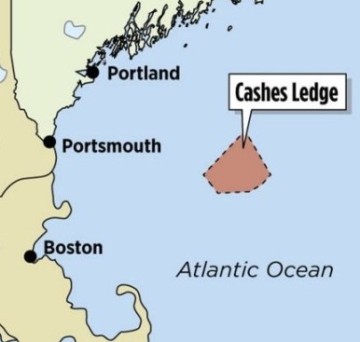 In the final months of President Barack Obama’s term, they’re hoping he’ll protect an underwater mountain and offshore ecosystem in the Gulf of Maine known as Cashes Ledge. They also want him to protect a chain of undersea formations about 150 miles off the coast of Massachusetts known as the New England Coral Canyons and Seamounts. The White House Council on Environmental Quality said in March, and reiterated last week, that while the New England Coral Canyons and Seamounts area is under consideration, Cashes Ledge currently is not. There are no marine national monuments in the Atlantic Ocean. The Conservation Law Foundation, which has been leading the Cashes Ledge effort, is continuing its campaign. It says that a coalition of environmental groups collected more than 250,000 signatures between August 2015 and this month in support of protecting both areas. Read the rest here 09:56
In the final months of President Barack Obama’s term, they’re hoping he’ll protect an underwater mountain and offshore ecosystem in the Gulf of Maine known as Cashes Ledge. They also want him to protect a chain of undersea formations about 150 miles off the coast of Massachusetts known as the New England Coral Canyons and Seamounts. The White House Council on Environmental Quality said in March, and reiterated last week, that while the New England Coral Canyons and Seamounts area is under consideration, Cashes Ledge currently is not. There are no marine national monuments in the Atlantic Ocean. The Conservation Law Foundation, which has been leading the Cashes Ledge effort, is continuing its campaign. It says that a coalition of environmental groups collected more than 250,000 signatures between August 2015 and this month in support of protecting both areas. Read the rest here 09:56
The Northwestern Hawaiian Islands monument expansion should be opposed – Lyn McNutt
 If you eliminate the U.S. (Hawaiian) fishery, then the area will be completely open to Illegal, Unregulated, Unreported (IUU) fisheries. U.S. fishers are regulated in equipment, species interactions (takes), amount of fish caught and they have VMS onboard as well as observers. The White House supposedly wants to regulate IUU fishing, but this action opens the door for IUU in the area. Who will stop IUU and how will they enforce rules? The state of Hawaii (DLNR) is very quick to claim how they are trying to create a “community” managed system of fisheries ecosystem management with consultation and community involvement in the planning, implementation and operation of community-based fishing. This top-down edict is a complete 180 from “community.” The Antiquities Act does not require any public input. A small group is forcing their view on the people of Hawaii Nei without any discussion of the public (local — not Mainland) perception on the use of the area. This is not pono. Read the op-ed here 10:31
If you eliminate the U.S. (Hawaiian) fishery, then the area will be completely open to Illegal, Unregulated, Unreported (IUU) fisheries. U.S. fishers are regulated in equipment, species interactions (takes), amount of fish caught and they have VMS onboard as well as observers. The White House supposedly wants to regulate IUU fishing, but this action opens the door for IUU in the area. Who will stop IUU and how will they enforce rules? The state of Hawaii (DLNR) is very quick to claim how they are trying to create a “community” managed system of fisheries ecosystem management with consultation and community involvement in the planning, implementation and operation of community-based fishing. This top-down edict is a complete 180 from “community.” The Antiquities Act does not require any public input. A small group is forcing their view on the people of Hawaii Nei without any discussion of the public (local — not Mainland) perception on the use of the area. This is not pono. Read the op-ed here 10:31
Antiquities Act abuse heads East – U.S. Rep. Rob Bishop (R-Utah)
 Some say cultural trends start on the West Coast and make their way East, but one trend moving eastward is bad news for New Englanders. In my home state of Utah, the federal government owns 65 percent of the land. That is a problem. In the waning days of his administration, President Clinton compounded the problem by mandating the Grand Staircase Escalante National Monument. With virtually no local support, he locked up 1.7 million acres of Utah, an area larger than some states. This monument designation was an abuse of the Antiquities Act. Passed in 1906, the Antiquities Act was originally intended for presidents to quickly prevent looting of archaeological sites. The executive power exercised under the Antiquities Act has grown far beyond the original purpose.,, The same story threads throughout the West, most recently in February when President Obama — who has designated the highest acreage of national monument land and water of any U.S. president — designated three different national monuments in the California desert. Now the president has his sights set on New England fisheries off the coast of Cape Cod. Read the rest here 08:46
Some say cultural trends start on the West Coast and make their way East, but one trend moving eastward is bad news for New Englanders. In my home state of Utah, the federal government owns 65 percent of the land. That is a problem. In the waning days of his administration, President Clinton compounded the problem by mandating the Grand Staircase Escalante National Monument. With virtually no local support, he locked up 1.7 million acres of Utah, an area larger than some states. This monument designation was an abuse of the Antiquities Act. Passed in 1906, the Antiquities Act was originally intended for presidents to quickly prevent looting of archaeological sites. The executive power exercised under the Antiquities Act has grown far beyond the original purpose.,, The same story threads throughout the West, most recently in February when President Obama — who has designated the highest acreage of national monument land and water of any U.S. president — designated three different national monuments in the California desert. Now the president has his sights set on New England fisheries off the coast of Cape Cod. Read the rest here 08:46






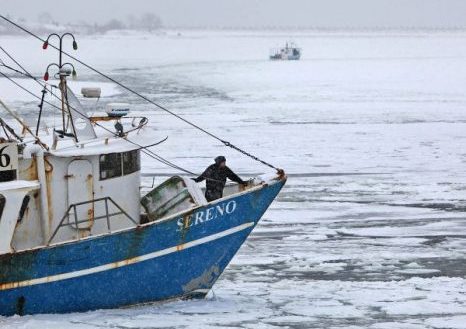
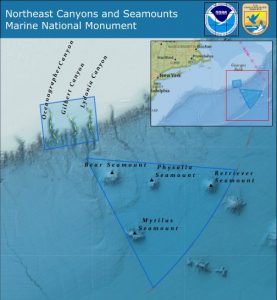 A coalition of New England fishermen organizations filed suit today over former President Barack Obama’s designation of a vast area of ocean as a national monument — a dictate that could sink commercial fishing in New England. The organizations filing the lawsuit are the Massachusetts Lobstermen’s Association, Atlantic Offshore Lobstermen’s Association, Long Island Commercial Fishing Association, Rhode Island Fisherman’s Alliance, and Garden State Seafood Association. They are represented, free of charge, by Pacific Legal Foundation, a watchdog organization that litigates nationwide for limited government, property rights, and a balanced approach to environmental regulations. The lawsuit challenges President Obama’s September 15, 2016, creation of the Northeast Canyons and Seamounts Marine National Monument, 130 miles off the coast of Cape Cod.
A coalition of New England fishermen organizations filed suit today over former President Barack Obama’s designation of a vast area of ocean as a national monument — a dictate that could sink commercial fishing in New England. The organizations filing the lawsuit are the Massachusetts Lobstermen’s Association, Atlantic Offshore Lobstermen’s Association, Long Island Commercial Fishing Association, Rhode Island Fisherman’s Alliance, and Garden State Seafood Association. They are represented, free of charge, by Pacific Legal Foundation, a watchdog organization that litigates nationwide for limited government, property rights, and a balanced approach to environmental regulations. The lawsuit challenges President Obama’s September 15, 2016, creation of the Northeast Canyons and Seamounts Marine National Monument, 130 miles off the coast of Cape Cod. 
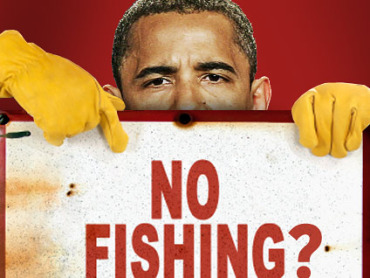




























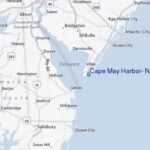

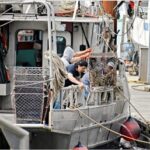
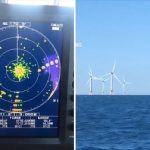


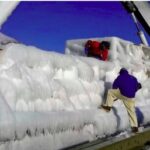



Interior Department Releases List of Monuments Under Review, First-Ever Formal Public Comment Period for Antiquities Act Monuments
Share this post